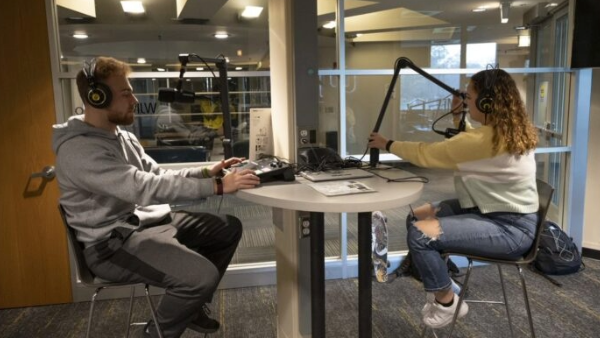Since the early 2000s, podcasts have given listeners a new way to enjoy radio.
“Besides sports radio, podcasts are the hot button thing,” says Communication and Language Studies Instructor Mike Montecalvo, who also serves as Bryant’s WJMF Radio advisor.
Due to the increase in the audio series’ popularity, Montecalvo created the College of Arts and Sciences’ “Talk Radio: Sports, Politics, and Podcasting” course, which focuses on developing and planning live or taped talk show and podcast segments.
As someone who’s worked in broadcasting — both radio and TV — for 42 years and currently co-anchors newscasts on WPRI 12, Montecalvo offers advice for how you can successfully launch your podcast:
1. Select a format and topic
Before recording your first show, you’ll need to determine your podcast’s format: Do you prefer a solo show? Would you rather be live with multiple people? In either case, Montecalvo says podcasters should keep the same format week to week, so listeners know what to expect when tuning in.
Additionally, podcasters should select a broad topic and consider how the show will change each week. Montecalvo adds that if the topic is fun, make the podcast fun. If the podcast is more serious, podcasters can engage their audience by being informative and bringing on great guests.
2. Prioritize energy, personality, and opinion
Since there’s already a strong selection of podcast talent reaching listeners, your show needs to be unique if you want to attract an audience.
“What's the wow factor in your show? What are you going to tell me that somebody else won’t?” Montecalvo asks.
Montecalvo suggests podcasters work on developing their radio personality; they should also have energy and be opinionated — with research to back their stance.

3. Take time to research
“If you're going to invest the time in a podcast, you should do a show at least once a week,” Montecalvo says.
Planning a show requires research, whether that’s searching for information online or analyzing a sports game that you plan to recap. Research will add depth to your show and display that you know what you’re talking about. Without research, your questions will be very general, and listeners will realize their host doesn't know the topic and won't listen.
4. Be intentional with questions and follow up
You should always be aware of the time you have to interview someone on your show. If you’re short on time, make sure your questions are intentional and to the point. Montecalvo notes that listening closely to what guests say can also prompt follow-up questions that add more depth to the conversation.
“There's an art to listening and the questions you can come up with,” Montecalvo says, adding that he often has students create 15-minute shows since it challenges them to develop better interview questions.
5. Remember to have fun
Whether you’re pursuing podcasting as a fun hobby or looking to make it into a profession, Montecalvo says it’s important to have fun through the process.
“Life is stressful, and I tell my students all the time that you’ve got to have some fun,” Montecalvo says, adding that they get to learn different things through the process. He notes that radio is a great avenue for people who do not believe they’re creative. Once they start a podcast, they may find that they have a knack for developing and producing shows.
Students, faculty, or staff interested in running their own podcast out of one of WJMF’s three podcasting rooms can contact WJMF Radio at wjmf@bryant.edu. Podcasters will be trained to use the equipment.